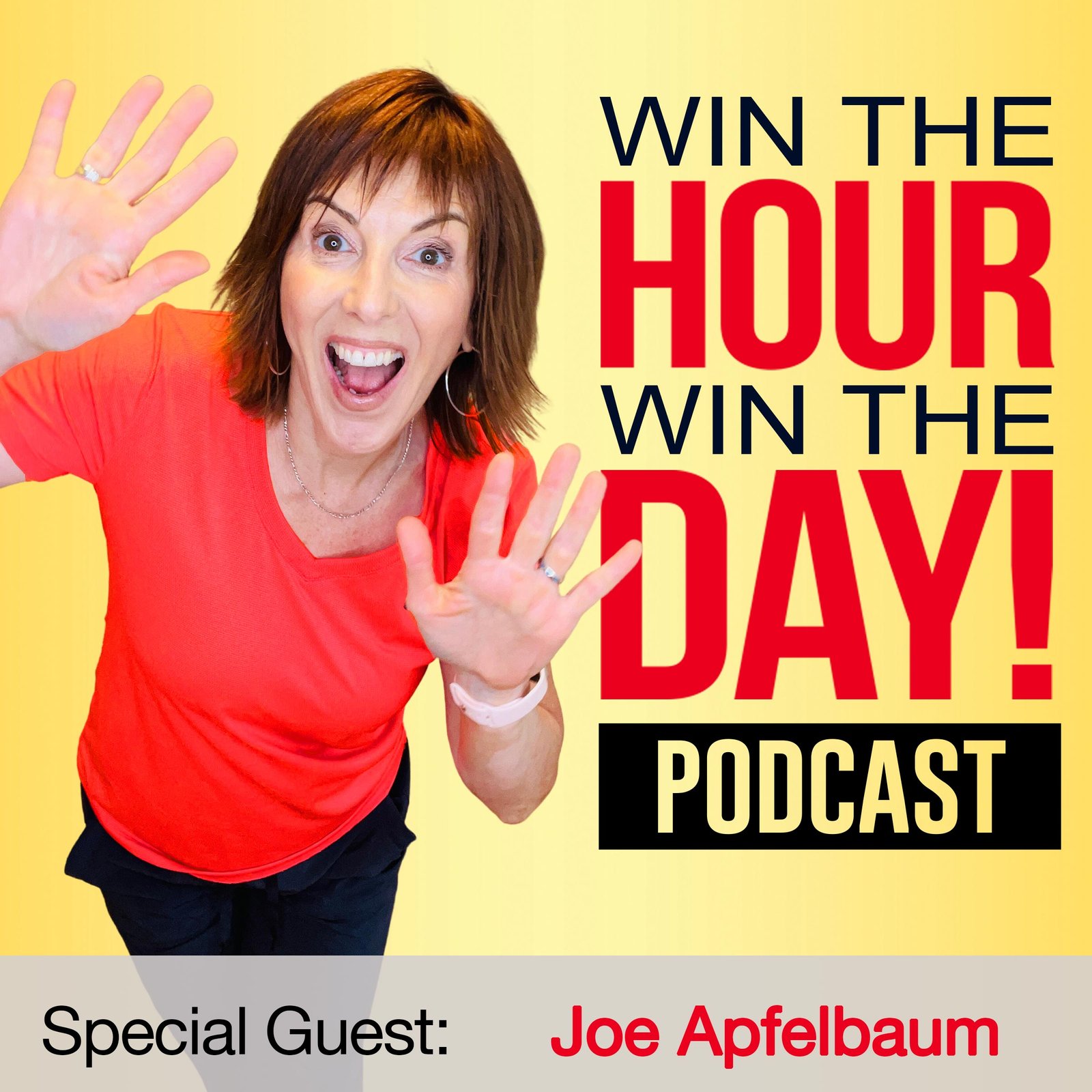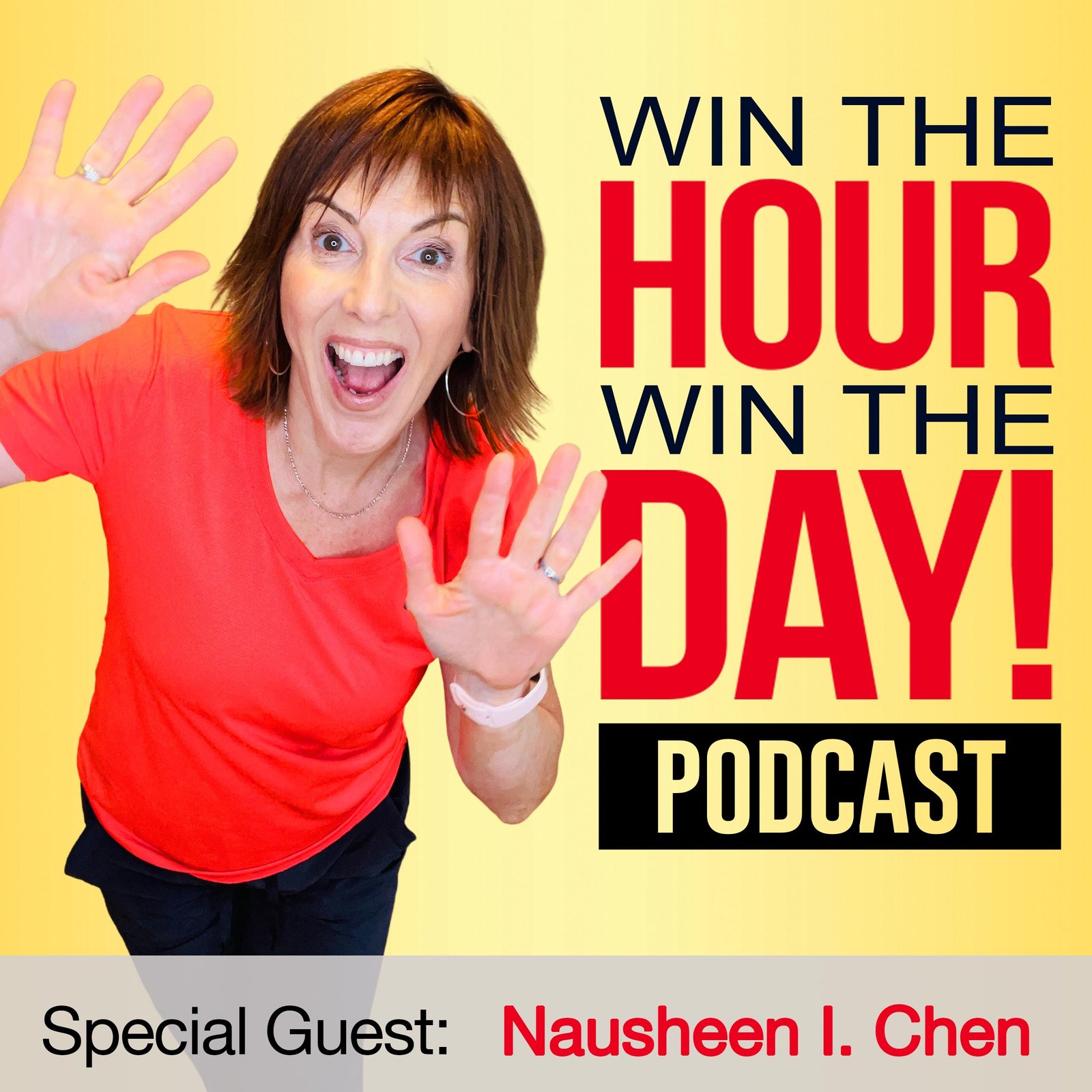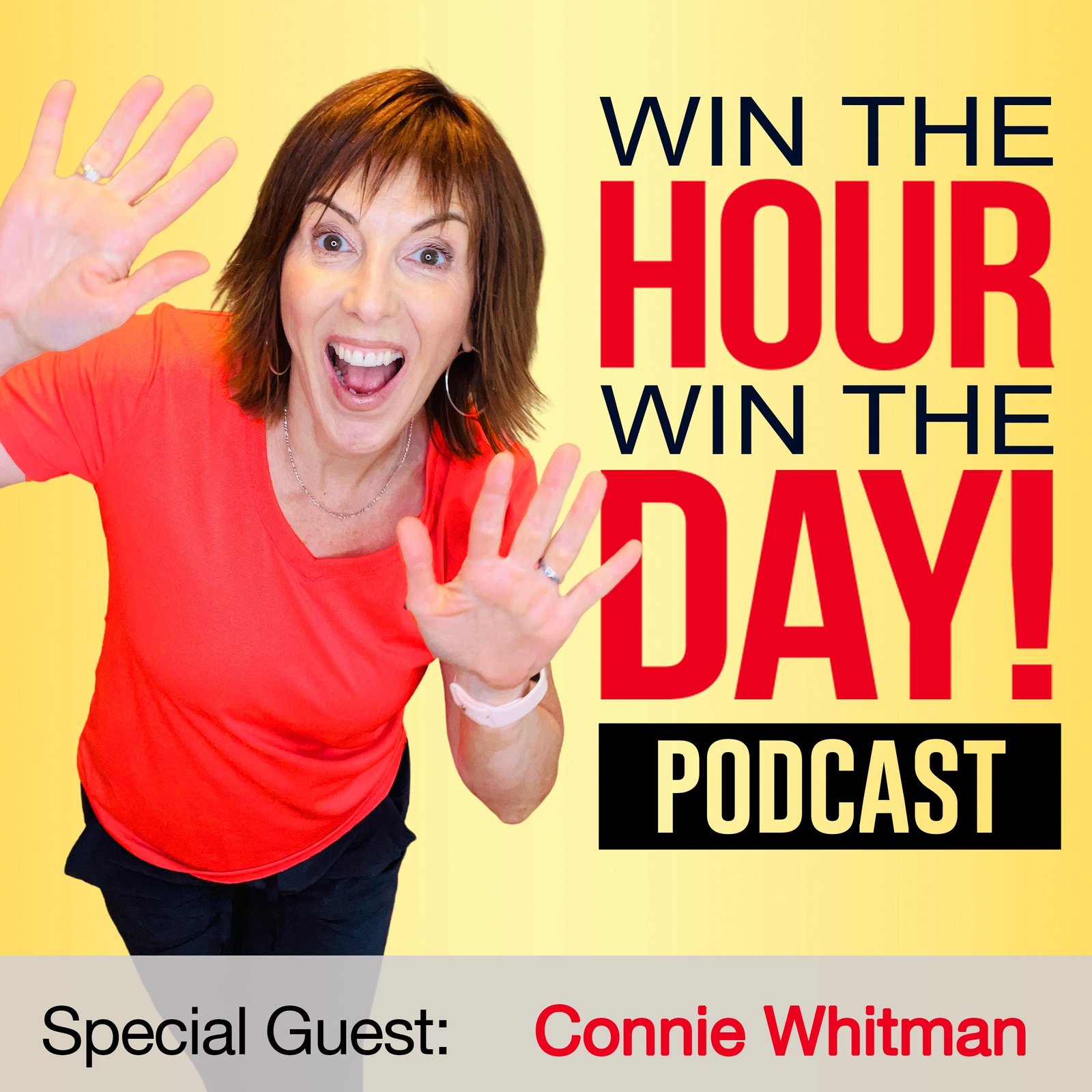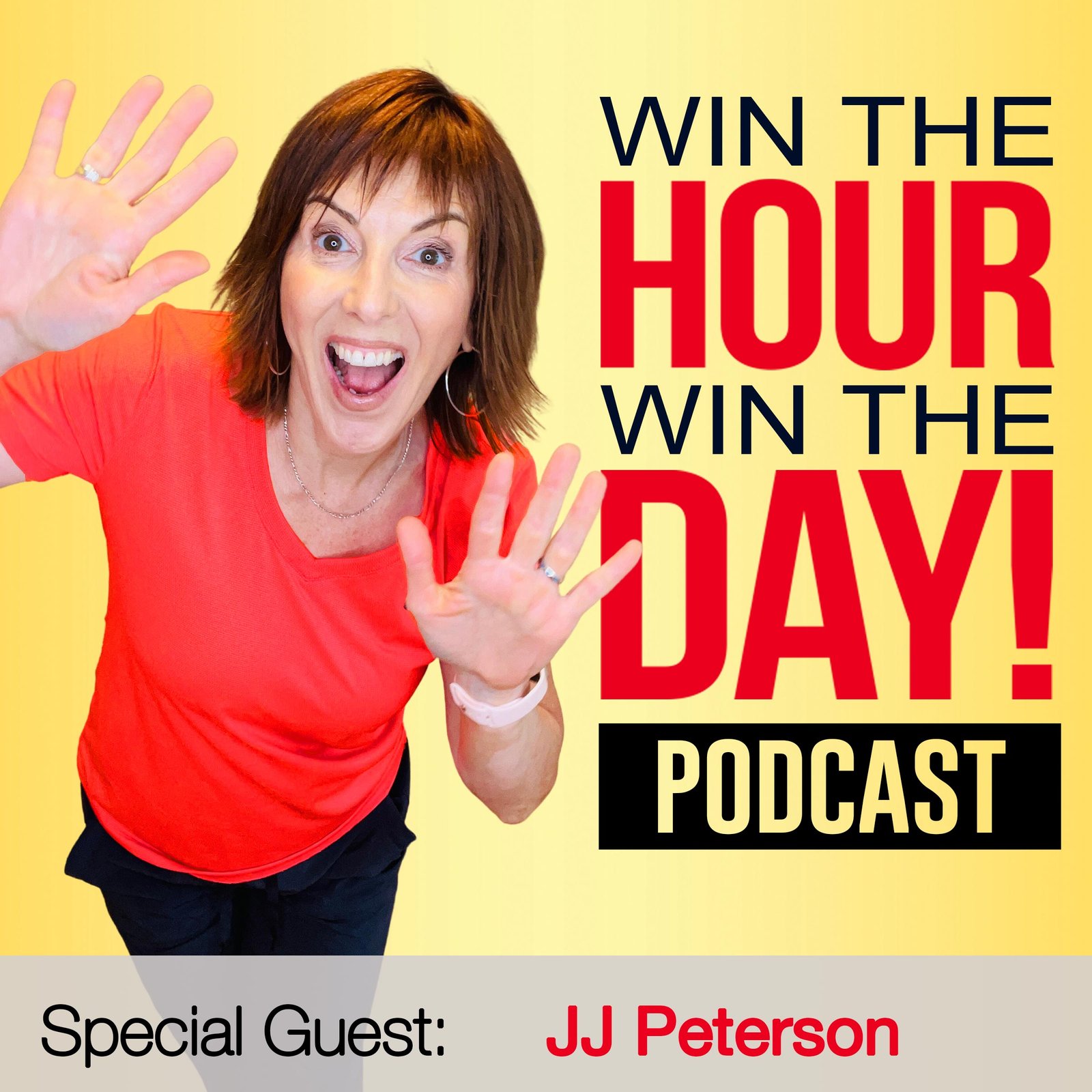Episode Summary This week’s episode of Win The Hour, Win The Day Podcast is...

Are You Ready For Your Next Big Win?
Know your entrepreneur personality and I’ll take it from there!
Recent Podcast Episodes
Preventing Burnout with Smart Work Tools! with Kris Ward
Episode Summary This week’s episode of Win The Hour, Win The Day Podcast is...
Master Social Selling: Heidi Medina’s Strategies for Engagement
Episode Summary This week’s episode of Win The Hour, Win The Day Podcast is...
Boost Productivity and Master Storytelling! with AmondaRose Igoe
Episode Summary This week’s episode of Win The Hour, Win The Day Podcast is...
Master Video Marketing: Top Tips for Entrepreneurs with Dan Bennett
Episode Summary This week’s episode of Win The Hour, Win The Day Podcast is...
Boost Your LinkedIn Strategy with AI Tools for Enhanced Productivity! with Joe Apfelbaum
Episode Summary This week’s episode of Win The Hour, Win The Day Podcast is...
Mastering Personal Branding with NLP Techniques! with Olesija Saue
Episode Summary This week’s episode of Win The Hour, Win The Day Podcast is...
Innovative Lead Generation and Email Automation Secrets with Jennie Wright
Episode Summary This week’s episode of Win The Hour, Win The Day Podcast is...
PR Strategies for Diverse Entrepreneurial Impact! with Jennifer Singh
Episode Summary This week’s episode of Win The Hour, Win The Day Podcast is...
Convert More Clients on LinkedIn with Richard Moore
Episode Summary This week’s episode of Win The Hour, Win The Day Podcast is...
Master Business Growth on Pinterest with Meagan Williamson
Episode Summary This week’s episode of Win The Hour, Win The Day Podcast is...
24/7 Sales Boost: Video Marketing Secrets with Alex Sheridan
Episode Summary This week’s episode of Win The Hour, Win The Day Podcast is...
Master Public Speaking Tips with Nausheen Chen!
Episode Summary This week’s episode of Win The Hour, Win The Day Podcast is...
Beating The Burnout With Connie Whitman’s Success Story
Episode Summary This week’s episode of Win The Hour, Win The Day Podcast interviews,...
Craft Your Social Media Content Strategy With Shannon McKinstrie
Episode Summary This week’s episode of Win The Hour, Win The Day Podcast is...
Boost Your Productivity with AI Tools: A Deep Dive with Erik Fisher
Episode Summary This week’s episode of Win The Hour, Win The Day Podcast is...
Boost Visibility: Repurpose Content and Leverage Podcasts With Christina Lenkowski
Episode Summary This week’s episode of Win The Hour, Win The Day Podcast is...
Master Personal Branding & Storytelling with Lisa McGuire
Episode Summary This week’s episode of Win The Hour, Win The Day Podcast is...
Boost Business on LinkedIn with Catherine B. Roy’s Strategies
Episode Summary This week’s episode of Win The Hour, Win The Day Podcast is...
Scale Your Business: Optimizing Virtual Assistant Services with Kris Ward & Rachel Eubanks
Episode Summary This week’s episode of Win The Hour, Win The Day Podcast is...
Affordable PR Mastery: Crystal Richard Unveils Modern Techniques
Episode Summary This week’s episode of Win The Hour, Win The Day Podcast is...
Mastering Business Storytelling with JJ Peterson’s Guide
Episode Summary This week’s episode of Win The Hour, Win The Day Podcast is...
Revamp Your About Page: Guide to Personal Branding
Episode Summary This week’s episode of Win The Hour, Win The Day Podcast is...
LinkedIn Mastery and Video Marketing Secrets with Alex Sheridan
Episode Summary This week’s episode of Win The Hour, Win The Day Podcast interviews,...
The Systems and Processes Playbook: Insider Secrets to Streamlining Your Small Business with Leah Abunales
Episode Summary This week’s episode of Win The Hour, Win The Day Podcast interviews,...
Master Keywords for SEO Success!! with Jeffro Fulkerson
Episode Summary
This week’s episode of Win The Hour, Win The Day Podcast is sponsored by Win The Hour, Win The Day’s Signature Coaching Program the Winners Circle. Kris Ward who helps entrepreneurs to stop working so hard interviews, Jeffro Fulkerson.
Join Jeffro as he guides us through the amazing world of SEO. He’s here to help us avoid getting lost and make the journey fun and easy!
In this podcast, you’ll learn:
-The most common mistakes people make with SEO and how to fix them.
-How to make your business grow by getting a higher rank in SEO.
-Discover simple tricks that many people overlook but can have a big impact.
-Get ready to explore SEO with Jeffro and learn lots of cool stuff that will help you get more traffic to your website.
Scale Your Business Scorecard
https://bit.ly/3Iyf4AU
Win The Hour, Win The Day! www.winthehourwintheday.com
Podcast: Win The Hour, Win The Day Podcast
Facebook: https://www.facebook.com/winthehourwintheday/
LinkedIn: https://www.linkedin.com/company/win-the-hour-win-the-day-podcast
Win The Hour, Win The Day Winners Circle: https://winthehourwintheday.com/winners-circle-masterclass
You can find Jeffro Fulkerson at:
Client Acquisition System: frobro.com/booked
Website: https://www.frobro.com/
Win The Hour Win The Day
https://winthehourwintheday.com
Jeffro Fulkerson Podcast Transcription
[00:00:00] Kris Ward: Hey everyone. Welcome to another episode of Win the Hour, Win The Day and I am your host, Kris Ward. And today in the house we have Jeffro. Now you’re gonna find out, we call him Jeffro. You just gotta look this up online. I’ll give you a hint. The hair and do is a bit tall. Anyhow, we are gonna dive into we’re gonna focus on SEO type stuff from an expert in digital marketing. Welcome to the show, Jeffro.
[00:00:26] Jeffro Fulkerson: Thank you, Kris. I’m excited to be here.
[00:00:28] Kris Ward: Okay. All right. Now listen, before we get started, SEO can sound a little bit dry a little bit. I know. I shied away from it for a long time. It’s er, turn the car around. We’re going the other direction. Cuz it just seemed I don’t know, like the accountant and the dentist having lunch together.
[00:00:43] It seemed painful and like a whole thing on its own, but I think you do give some very salient and empowering points of things that we can tweak and make effective and really help us out. Quick and easy. Quick and easy, right? That’s what we’re all about here. Tangible results. Alright, so where should we start?
[00:01:02] What do we need to know about seo and where can we make this less pain, make it painless, less painful than usual.
[00:01:12] Jeffro Fulkerson: Let me start by just defining what it is and what the goal is. Okay. So search engine optimization really just means you’re taking your website and you’re optimizing it or improving it so that the search engines like Google list it and show it in results for the appropriate search queries so that when someone goes online and types in productivity tips, is your website gonna come up?
[00:01:34] If that’s the thing that you’re doing right? You do a little bit of research to figure out what people are searching for, and then based on that, you go back to your site and say, okay, I want this page to rank for that term. How can I improve that? So that’s what we’re doing. It’s not a magic switch that you know, marketers have that we can turn on for you.
[00:01:50] We are actually doing this research and effort to go in and make these changes. So one thing that most people don’t do is ever think about this. But if you look at your title tag on your homepage this is the thing that shows up in that top tab in your browser, okay? That says the name of the page.
[00:02:07] So most people, by default, it usually says something like Home Kris Ward, right? Because it’s the homepage. Sure. That’s great.
[00:02:15] Kris Ward: Yeah.
[00:02:15] Jeffro Fulkerson: Except Google and the search engine engines are looking at the title tag as one of the most important indicators of what this page is about. And so if all you have is home and your name, that’s a missed opportunity because first of all, people who haven’t found you yet don’t know who you are, so they’re not searching by your name, and they’re not searching for home if you’re not in home goods or home renovations or something like that.
[00:02:39] So that’s your first opportunity to just change that to a relevant keyword like productivity tips for entrepreneurs, Kris Ward, or whatever it is, right? Yeah. Get that keyword in there and that by itself will help Google figure out when to show your page.
[00:02:52] Kris Ward: Okay, let me just stop for a second to unpack this because I remember when we, when I finally figured this, I shouldn’t say when this, when I finally was able to hear this knowledge and I thought, dear heaven’s a mercy, how long have I been in business?
[00:03:02] Because we all get so seduced into, oh, this should be pretty, and look at my competitors and their stuff looks nice and they’re doing better than me and they have a red website, so I need a red website, right? Not looking at the really, like a car, not looking at the engine in the vehicle, right? Also, would you suggest, now that you bring up this really good point, is that something that we should be revisiting once a year, every six months, saying, okay, should we try some new keywords or are we ranking better for these, or should we be playing around with that more often than we are?
[00:03:33] Jeffro Fulkerson: Good question. I’d say no, you probably don’t want to change the keywords.. You
[00:03:36] Kris Ward: Okay.
[00:03:37] Jeffro Fulkerson: Trying to go after, just because SEO can take a while to solidify, okay? Your rank, you’re competing against other companies who are trying to rank for the same thing, right? And so if you change it up, you’re basically cutting yourself off at the knees every time you start to make a little progress.
[00:03:51] So that’s why we do the research upfront to figure out, okay, is there a decent search volume for this term? Is it a good fit for what I’m doing? All right, let’s commit. Now, I usually recommend only picking one keyword phrase per page. So if there is another keyword phrase you want to rank for, you should start a separate page for it.
[00:04:08] So you should definitely have a separate service page for each service that you offer, or a separate product that you have that way you can go deep on those and you can rank on different terms for each page.
[00:04:18] Kris Ward: Okay. That’s a good point. Okay. All right. So that’s a mistake that we more of us are making than we’d like to admit.
[00:04:26] Thank you. Okay. I know we, does that lead into, can you talk a schema about FAQs? I didn’t. That’s a whole thing on its own, and I barely understood it when you explained it to me.
[00:04:38] Jeffro Fulkerson: Sure. So that’s just another way to improve your visibility on the search engine results page. Okay. So when you go to Google and you type a question like, how do I be more productive?
[00:04:48] There’s sometimes a little box. There was several little expandable questions people also ask this and you expand it and you get a snippet from somebody’s website.
[00:04:56] Kris Ward: Okay?
[00:04:56] Jeffro Fulkerson: Now, they didn’t do anything. They didn’t go pay Google to show that. All they did is they used FAQ schema. They formatted. The frequently asked questions on their own website in a way that Google understands that, Hey, this is a question.
[00:05:09] And that’s how Google’s going to display it. There’s lots of different types of schema, okay? There’s schema for video posts and audio posts, and Google picks that up and sometimes displays it differently. Like recipes is another example. If you use proper recipe schema, you’ll notice at the top of a search for a recipe, there’s some that show with a picture and a title right at the top.
[00:05:29] That’s because they’re using the schema that Google understands that this is a recipe, so I’m gonna format it a certain way. So same idea with FAQs. As long as you format it a certain way, Google notices that and picks you outta the crowd to show to people. Cuz now you’re providing a specific, helpful answer to a question.
[00:05:45] Kris Ward: And I’m not sure if we’re doing this or not because I’m not in charge of that, but I have to say I’ve not heard that word before. So is it as scary as it sounds or it’s not so hard to set up the schema? We can just follow the steps to doing that.
[00:05:59] Jeffro Fulkerson: It probably depends on what website platform you’re using.
[00:06:01] Kris Ward: Okay.
[00:06:01] Jeffro Fulkerson: It’s usually not too difficult, okay. A worst case you add a plugin to format it for you, okay? Or ask your web person to handle it and they should be able to figure it out.
[00:06:10] Kris Ward: All right. New word, boys and girls. Write that down. Schema. Okay. Didn’t know that. Okay. All right. We don’t know what, we don’t know where would you like to take us with some of the most common missteps that you probably see and make you crazy?
[00:06:24] Jeffro Fulkerson: Another thing that we see, I touched on it earlier with the one keyword phrase per page. If you don’t do that and you’re not intentionally picking a phrase to rank for, you might be talking about the same thing a lot on different pages, and that can lead to something called keyword cannibalization, which basically means you’re fighting against yourself for ranking.
[00:06:42] Kris Ward: Oh. Hold on. I’ve not heard that. That is a good one. Keyword cannibalization. Now it, you need to be doing that conversation sober. Make sure you pronounce it out, but that Okay. That’s powerful. All right. That is a really good point. I think I think where we get confused because so many of us, okay, listen, now I got too many pay attention.
[00:07:00] I’m gonna tell you three things at the same time, Jeff. All right. Okay. One of the things that I recently, I don’t know if this is a great idea or I’m almost embarrassed to say this out loud, but we see this website is the bane of our ex existence. You just gotta get it done and you put it out there.
[00:07:14] But if we were aware, It is really the storefront to our business. Now, we know that in theory, but we have so much to do that we forget that. So what I started doing with my team is we meet every Thursday. Now, forgive me if you hear background noise. I have construction going on my house and listen, my uncle’s here, so he’s doing some of it for free.
[00:07:35] So I’m not about to inconvenience him. So I’m like, sure, you just, you go where you go. No worries. Yeah, so what I would say is we started revisiting my website. We have a team meeting every Thursday and we go over it because what looks good in copy SEO aside, Nevermind you find mistakes, you find this, but then I wrote this in copy over here, and then when we put it on the website, it looks very different.
[00:07:55] Or I’m like, that wasn’t it. That doesn’t read like I thought it read that last week. You know what I mean? It just sees it differently and I think that we all forget how important the website is that everybody else is visiting it, but we’re not. So now we revisit ours every week because and every week I’m frightened about how much work there was to do from the week before.
[00:08:14] Things that didn’t look good, but I think for whatever reason, all of us are just so busy and we hope it gets done and then we think we’re done with it.
[00:08:22] Jeffro Fulkerson: I see that a lot. A lot of business owners, that’s one of the first checklists when they start a business, right? They create the corporation, they register the domain, they put up their website, and then they never think about it again.
[00:08:31] Yeah. But to your point, this is your first impression. People are judging you. Like it or not, they’re gonna judge you based on what your website looks like, and as you’ve seen by how much work there is, if you’re checking it every week, your website’s never done. Mine’s never done. I’m redesigning it right now.
[00:08:46] Yeah, and that’s just because things change. Your business changes and you gotta make sure that your messaging is accurate. You’re talking to your right target avatar, you’re leading people to your latest promotion. Whatever it is, there’s always gonna be tweaks and improvements that you can make.
[00:09:00] So if you think of it from that perspective as investing time into making this something that works for your business as an asset that generates clients, okay, then it’s worth it and it makes sense as opposed to something that you just paid for once and it sits there.
[00:09:13] Kris Ward: Yeah. So back to your point about the cannibalization. I think also some of us got stuck in the idea of this is a brochure or a book. And so what you’re saying is, if one of my keywords is outsourcing, then I wanna have a focus on that, on page whatever too, for lack of better word. And then on page three, I would talk about systems and processes, which is another key word.
[00:09:37] Instead of having them talking about both of those things throughout the site. Is that what you’re saying?
[00:09:44] Jeffro Fulkerson: I’m not saying you can never say those terms on other pages. But when you do, let’s say you’ve got a service page about your main, offering, but then you have a blog post that talks about something related to that offering.
[00:09:56] Okay. When you mention that specific service in the blog post, link it back to the main service page. Oh, okay. And what that does you start sending that link juice, for lack of a better term, to that main page and you’re saying no, that one’s more important than me. Okay. When I talk about this I’m sending people over here.
[00:10:16] This is the one that I want to rank for and you can do this internal site structure audit. Basically, you look at all your pages and see, okay, what’s linking to what are the main canonical pages that should be ranking for this term? Or, which one can I add links to prop up this one?
[00:10:32] Because otherwise, if they’re all trying to ring for the same thing, when you’re talking about it. Then you’re hurting both pages as opposed to consolidating that and saying, no, this one’s more important. So bump that one up and forget about the secondary one.
[00:10:44] Kris Ward: I’m not gonna lie, these are all very valid points and yet I do still feel my SEO headache kicking in.
[00:10:49] So okay, so my, so also another thing when we’re writing a blog, sometimes we’re doing links to other blogs. Are you, is that okay? Or It should, the link should always be back to the website.
[00:11:02] Jeffro Fulkerson: Links to other blogs, help those blogs, and that’s fine. Okay. It’s, but if it’s something you offer, then you should be linking to yourself.
[00:11:10] Kris Ward: When I say other blogs, I mean my other blogs if I’m writing. Oh, blog post. Yeah. Yeah. My other blog. Hello. Not other people. It’s all about me right now, so no. If I wrote a blog. Here and then I link it back to another blog similar to expand on that subject. Cause we thought the back links or whatever was working, but Oh, would the priority over that be to the page on the website? Or I could do both?
[00:11:32] Jeffro Fulkerson: You can do both. Cuz again, it goes back to what keyword you’re trying to rank for. Okay. So let’s say your blog post is trying to rank for something specific. Okay. Use that phrase in your other one that’s linking to it as the anchor text. Okay. The text that you click with the link that goes to that page.
[00:11:48] Kris Ward: Okay. All right.
[00:11:49] Jeffro Fulkerson: That’s a signal to Google that this phrase is more handled better over here on this page.
[00:11:55] Kris Ward: Okay. All right. Okay.
[00:11:58] Jeffro Fulkerson: I’m just, you’re getting more technical
[00:12:01] Kris Ward: and I can see why it gets get quickly, but these are all really, because it really. At surface level though, when we all do this and we’ve all done it, and I’m still doing it to some point where we look at this pretty website, it’s really almost like having a picture book with no words in it.
[00:12:18] That’s the problem you saying, okay, I got it up. It looks good. But that’s fine. If nobody knows it’s on the shelf and you just got a picture book, who the hell cares? Let’s talk a little bit about, this came up in conversation. We were chatting about your Google Business profile. Now, I know in the past I’ve heard that’s primarily for small business and we’re a local business and we’re dealing with service-based businesses around the world. But I still think there’s some purpose to that. Am I correct on that?
[00:12:45] Jeffro Fulkerson: You are, and I’m a service based business that works with companies across the country. I still have a Google business profile. I keep it up to date. It’s important that you optimize it too, where you list all the categories that you are working in, the services that you offer.
[00:12:59] You get reviews there, you post regularly, all of this. It tells Google, Hey, I’m an active business. Respond to the comments, respond to the reviews. Those are all signals to Google that, hey, maybe this is a good result for people. And so they’re more likely to show you compared to somebody else who doesn’t have that profile or who has a less active profile. All other things.
[00:13:18] Kris Ward: Yeah I neglected that for a really long time cuz everyone kept saying it was for local business and I thought, Google or not, does it not help when you’ve got 55 star reviews on there, like human eyeballs, Google or not will go, oh, she’s got all these reviews. And then I made another mistake.
[00:13:33] I don’t know who I keep asking all these questions to, but I’m asking the wrong people because then I made another mistake. I was like, I said do I respond to the people when they post? Now, we have a part of our processes, in different ways. And so that’s fine. So when you send me and when I get notified from Google that you have given me review, I always thank the person I’m all about being thank, like being thankful.
[00:13:55] So I’ll reply in email saying, thank so much. I really appreciate that. Can I review something for you? Blah, blah, blah, blah. But I wasn’t responding on Google cuz I thought, oh, it doesn’t affect the seo. But then I realized, who says it doesn’t, and it’s another touch point for Google. They see I’m active, but I also thought then people are reading it so that when somebody says something nice about me, even when I reply and say thank you, that means a lot coming from someone with your business chops and your background.
[00:14:23] I really appreciate that. Then it shows not only am I, hopefully a nice person, but also the value of the person giving me the review and the compliment.
[00:14:33] Jeffro Fulkerson: Yeah. It amplifies it. Yeah. And it lets the people, scrolling through the reviews know that you’re there and responsive and probably a good person to work with.
[00:14:41] I
[00:14:42] Kris Ward: dropped the ball on that one for a long time. I don’t know, I don’t know where this happens, but I swear Business 1 0 1. It’s I think we step over the website’s cold, dead body and crawl onto something else and think, I guess maybe it’s social media. We just kept thinking, oh, that’s where you gotta be.
[00:14:57] That’s where you gotta be. And so to heck with that, but clearly this is powerful stuff. Okay, so give us some things that, I don’t wanna say make you crazy, but where are we dropping the ball that we just don’t even know what we don’t know?
[00:15:11] Jeffro Fulkerson: As one of the first things we talked about was that title tag. Oh, I see that all the time. So that’s number one. But then the next step beyond that is that the heading tags, so you usually see big heading fonts. And they get smaller up down the page. And usually in an editor you can choose what type of heading it is. There’s actually an SEO importance to those different heading titles and H one Tag, which is usually the biggest.
[00:15:35] That’s the most important to Google again, because next to the title tag, it’s signaling to Google that this page is about this topic. So you want your keyword phrase somewhere in your H one tag as well. Now the H twos and H threes, those are useful for separating the categories and sections on a page.
[00:15:54] Okay? And Google does look at those to help organize the content and figure out what’s relevant. But the main thing is H one and the title tag. And sometimes I also see people have multiple H one tags for some reason, which is a problem. Okay? And people might think you’re trying to cheat the system and they might ding you for that.
[00:16:12] There should only be one H one tag. You can have multiple H twos and threes and all that. There should always only be one H one tag.
[00:16:19] Kris Ward: Now, in the case of this, where I have this podcast and it’s more general business, it’s not the focus of what I do, but when we, every time we air, we do a show, we then put it on our podcast page, but it is going to different, different topics.
[00:16:35] Like here we are talking about seo, it could be LinkedIn, which are not my primary things. Does backlink still help me? That I’m well connected into the world. I’m not working against myself because it’s not in my zone of genius. We also post all the shows that I’m on as well, on a different page. I think it’s called, I don’t know what it is, but it’s something.
[00:16:55] Media page, I think it is. So I’m not cannibalizing or doing these violent things to myself that you’ve suggested by having these shows aired on the pod.. on the website?
[00:17:07] Jeffro Fulkerson: No, not necessarily.
[00:17:08] Kris Ward: Okay.
[00:17:09] Jeffro Fulkerson: There’s a lot of podcast websites out there and the fact that you are generating content on a regular basis, okay?
[00:17:14] Again, Google likes that. It shows your live active website and more in Google will more likely show your site compared to someone else because of that. That means you’re always updating, you’re always providing value. Google likes that. Now, let’s talk for a minute about the links to other sites, cuz I know that’s come up a couple times. When I’ve talked about linking a blog post to your service page, that’s an internal link that’s on your own website. But if you’re linking somewhere else or someone else is linking to you when someone else is linking to you, that’s called a back link. And those are signals to Google that you are authoritative on a subject and relevant, and people like your content.
[00:17:48] And the more back links you have, the more domain authority you have. So when you create a website, it looks at as, okay, this is brand new. You’ve got domain authority, zero. But the more people that like your stuff and share it, it all links back to your site. Who keeps track of that? And you improve your domain authority over time.
[00:18:06] And if you get links back from other zero websites, zero authority websites, eh, it helps a little bit. Not much. But if you get links back from sites with the, 80, 90 authority mainstream media sites, hey. That’s really good. That’s helpful. Who likes that? And they realize, Hey, this person knows what they’re talking about.
[00:18:23] I should bump them up in the rankings. And so this is part of why SEO is an ongoing never ending task. Because yes, there’s the on page stuff we’ve talked about optimizing your tags, and your keywords on the different pages. But this is the off page SEO where you’re getting these back links, maybe you’re doing guest posts on other sites to link back to ’em, but you’re posting on social media.
[00:18:45] People are sharing it, doing press releases to build up your domain authority so that over time your site continues to percolate up through the rankings.
[00:18:54] Kris Ward: Okay, so it’s almost back to high school what other people are saying about you or how many people know you when you walk into a room. It helps. Yeah. Okay. So it’s almost like I feel like we couldn’t even have I don’t know, kindergarten teacher on right now without talking about chatGPT. So there is some conversation people saying, oh, chatGPT is gonna replace Google and la of course the sky is always falling and I don’t think it’s as black and white as that.
[00:19:18] What, where do you see where one begins or the other ends? Like what are your thoughts in this time of change that we’re in right now?
[00:19:26] Jeffro Fulkerson: I think chatGPT is a useful tool. I don’t think it’s going to take over at this point. Obviously it’s getting better and able to help with a lot more things, but I see it as a tool, so you need to know how to use it.
[00:19:37] One way you can use it is to generate blog content on a regular basis. So you can give it prompts and say, Hey write me a blog post about X, Y, Z. And what I would recommend is not just taking it as it comes initially, you need to do a couple iterations. You gotta work on your prompt engineering.
[00:19:54] That’s another term that’s getting more popular. But that just means think about what you’re asking because chatGPT does what you tell it to. It doesn’t do what you want it to. And so you have to realize that you need to be very precise in your wording. And sometimes it’s not gonna understand it the way you think.
[00:20:16] And so it can take a few tries and so maybe you say, okay, that was good, but maybe can you rewrite it with a more casual tone and can change that third paragraph to expand more on blah, blah, blah. And okay, sure, it’ll redo it. But do that a few times until it sounds like you, it’s accurate. You have to check accuracy too, cuz once in a while it’ll make up facts.
[00:20:36] Kris Ward: Yeah. So it’s like being at a family dinner. That’s not true, mom. All right.
[00:20:41] Jeffro Fulkerson: Yeah. So don’t rely on it just to take what it gives you right away. You gotta work with it, massage a little bit, but it still can save you a ton of time.
[00:20:50] So if you’re generating new blog posts or even expanding the content on your existing pages, so let’s say one of your service pages, you have it there, but you’re not ranking for it. Oh, I might look at it and say, oh, you’ve only got 200 words on this page. That’s not enough content to really signal the Google that this page is authoritative on the subject, right?
[00:21:08] You’ve gotta add another thousand words or whatever it is. So that can help you there too.
[00:21:13] Kris Ward: I think too, I fell prey. It’s really easy to, there’s that saying, why are we all trying to fit in when we should be standing out? And then, but it’s so easy to follow prey to the formula. So I know when we started doing blogs more seriously, and my pet peeve is when blogs are so generic, there’ll be something like for productivity. Oh, you wanna work less hours, set a timer and stop every day at five. What the hell is that? When sure, that’s not the problem. It’s not that you don’t know what time it is. It’s like you don’t have the set up that you can leave work at five.
[00:21:41] So I find that insulting, however, at the same time when I started writing more and more blogs. If you’re not careful, you start following the tone. Even though I wanted my subjects to be more specific, they still come off very generalized, very, I don’t know, essay because that’s how all the other ones are out there.
[00:21:58] And then I had it really worked to find my voice and to talk about meaty things and to chisel down deeper than other people did, because it’s almost like it gets whitewashed when you, when everything around you is whitewashed and watered down, you think, oh, mine sound better than theirs, but it’s still watered down, just not as much.
[00:22:16] So I think to your point about chatGP T as well, even when you’re not using that, be careful of the blogs that you look at and think, oh, this one’s doing well. But is it really saying anything? And you can still do better, I think.
[00:22:29] Jeffro Fulkerson: Right. Yeah. And I’d say even when you get to that point where chatGPT’s giving you something decent, you should always add your own spin and..
[00:22:37] Kris Ward: A hundred.
[00:22:38] Jeffro Fulkerson: Yeah. Insert your own stuff cuz otherwise it is going to be mostly generic. And that’s just, it has to be it. That’s the way . That’s all it can be. So another thing I’ll mention one more thing thinking long term. Right now there are AI content I don’t know what the word is.
[00:22:54] It’s not a scanner, but basically you can identify, hey, this was written by artificial intelligence versus a human. So if all you’re doing is slapping that on your website, that could affect rankings in the future. We don’t know. But typically the trend that we’ve seen with Google and changing their algorithms is they tend to lean towards helping people find the best result.
[00:23:13] And so if your generated content is not the most helpful, it’s not going to perform well over time. So that’s another reason why it’s important to add your customized perspective in there to make sure that you are providing something unique and helpful as opposed to just cluttering the internet with more generated flow.
[00:23:31] Kris Ward: Yeah. Back to our original conversation. Just cuz it’s done doesn’t mean you’re done with it, right? So saying, great, I’ve got this ChatGPT gave me a blog, I put it up every Friday, I’ve done this, I’ve done that. It, I just have to keep reminding myself, what I said to my team is shame on me.
[00:23:47] The fact that we just do this and then leave it for six months and then I trip across it cuz somebody asked me a question, I think, oh, that doesn’t read the way I wanted it to, or whatever. And I realized no matter how small any shop in the world or the mall is they would just never, always come in the back door and never look at it from the front.
[00:24:04] Like you, you look at your display and what the world sees. So it is a constant reminder that it may be a nuisance, but it’s your nuisance and you have to keep it up.
[00:24:13] Jeffro Fulkerson: Yeah. And there’s other signals to Google with this too. Let’s say you write a page with ChatGPT and it starts ranking well.
[00:24:20] People see it in search results, click it, start reading, don’t finish, hit the back button and click another result on that search page. Google knows that. They say, Hey, you came back for something else. You didn’t like that page very much for that search query. I won’t show it to the next person. Wow. And that’s another reason to make your stuff good instead of, you always have to have quality, quantity helps if the quality is there. You can’t sacrifice the quality in order to get quantity. That’s why it’s hard to scale something like the blog post.
[00:24:49] Kris Ward: It’s I always give fitness as an example cause everyone’s always wanting to lose five pounds at some point in their life. So it’s almost like you’re like, oh, here’s the six ninja hacks to losing weight quickly.
[00:24:58] And then you go in and number one is I don’t know, stop having cake for breakfast. Or, you know what? There was, here I have to share this. I gotta just cuz we’re talking blogs here. There was some blog about the seven habits to have the healthiest lifestyle, right? And I like to be healthy and I try to be healthy.
[00:25:18] It’s a big part of my life and whatever. So I thought, I’ll just take a look at this. It popped up in case I’m missing one. So one was drinking lots of water. I do that we’re good there. And then there was exercise and there was some obvious ones, which I was about to back out going, this is so high level, so generic, you’d have to be new to the planet to not know this.
[00:25:36] And then number six was give up porn. I was like, we’re I’m really healthy cause I’m drinking lots of water. The porn is not a problem. I’m like, what is where? Where are you coming from when you wrote this blog? Clearly we’re in two different health paths. Like our journeys are very different.
[00:25:55] So I was like, that was interesting. So yeah, I don’t know how that blog did, but it was a, yeah, it turned me around real quick. Yeah.
[00:26:02] Jeffro Fulkerson: You gotta know your target market, huh?
[00:26:04] Kris Ward: Yes. Yes. Yeah. Okay, Jeff, where can we, Jeffro. Why can, where can we find more of your brilliance?
[00:26:12] Jeffro Fulkerson: My site is frobro.com. We’re a full service digital marketing agency, so we can help with seo. If you start getting lost in the weeds, you can definitely handle some of the low hanging fruit, like the title tag in H one yourself. But yeah, if you start getting overwhelmed we can do an SEO audit and we can help take that on on a monthly basis.
[00:26:29] We also do websites and ads and all that good stuff. But right now I’m helping a lot of service-based businesses because I know we’re always looking for more appointments, so I’m actually offering. Where we’ll build a client acquisition system for you that’s customized to your business and you won’t pay us until you’ve had 20 booked appointments.
[00:26:48] Kris Ward: Wow.
[00:26:48] Jeffro Fulkerson: So for that, go to frobro.com/booked and you can learn more about how that works.
[00:26:53] Kris Ward: That does sound interesting. We’ll make sure to put that in the show notes. Okay, everyone share this with one other business buddy. Help him out. No one should be suffering alone and we will see you in the next episode. And thank you so much Jeffro.
[00:27:05] Jeffro Fulkerson: Thanks for having me, Kris.





























